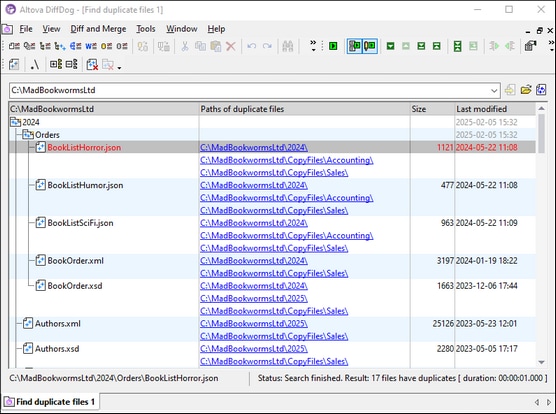Find Duplicate Files
DiffDog enables you to locate and delete duplicate files in a directory. Only items with the same names and contents are considered duplicates.
To search for duplicate files in a directory, take the steps below:
1.Click the ![]() toolbar command. Alternatively, select the menu item File | Find Duplicate Files. A new Find Duplicate Files window will open.
toolbar command. Alternatively, select the menu item File | Find Duplicate Files. A new Find Duplicate Files window will open.
2.Supply the path to a directory that you want to search for duplicates. You can do this in any of the following ways:
▪By typing or pasting the path in the text field and clicking the  (Apply) button or Enter.
(Apply) button or Enter.
▪By clicking the  (Open) button and selecting the relevant path. In the Enterprise Edition, you can also browse for remote directories. To select a remote directory, click Switch to URL. This will open the Browse for Web dialog, in which you will need to supply the URL and, if applicable, the identification details. For more information, see Switch to URL.
(Open) button and selecting the relevant path. In the Enterprise Edition, you can also browse for remote directories. To select a remote directory, click Switch to URL. This will open the Browse for Web dialog, in which you will need to supply the URL and, if applicable, the identification details. For more information, see Switch to URL.
▪By selecting a previously used path from the drop-down list of the text field.
3.The contents of the directory will be displayed. In case the  (Autostart Comparison) toolbar command is toggled off, launch the Find Duplicate Files functionality by pressing the
(Autostart Comparison) toolbar command is toggled off, launch the Find Duplicate Files functionality by pressing the  toolbar command or F5. You can now browse through the list of duplicates, delete them if necessary, and copy their names and paths. You can also filter out files without duplicates, toggle between relative and absolute paths, and expand/collapse the tree, by clicking the corresponding toolbar commands (see Toolbar Commands below).
toolbar command or F5. You can now browse through the list of duplicates, delete them if necessary, and copy their names and paths. You can also filter out files without duplicates, toggle between relative and absolute paths, and expand/collapse the tree, by clicking the corresponding toolbar commands (see Toolbar Commands below).
Overview of the Find Duplicate Files window
The screenshot below illustrates the Find Duplicate Files window. DiffDog has scanned the C:\MadBookwormsLtd directory and found that 17 files have duplicates. The status and the number of files with duplicates are displayed at the bottom of the Find Duplicate Files window.
Toolbar commands
The Find Duplicate Files window has the following duplicate-specific toolbar commands:
Icon | Description |
|---|---|
This command enables you to show/hide files that have no duplicates.
| |
This command enables you to show absolute or relative paths to duplicate files.
| |
Clicking this button expands the entire tree. To expand/collapse individual folders, double-click a folder of interest.
| |
Clicking this button collapses the entire tree.
| |
This command deletes the duplicate file you have selected. You can also delete a file via its context menu, the Delete key, or via the Diff and Merge menu.
| |
This command deletes all duplicated files from the selected folder, which is also possible via the folder's context menu, the Delete key, or via the Diff and Merge menu.
|
Table structure
The contents of a directory are displayed in tabular format. The table has the following columns: <Name>, Paths of Duplicate Files, Size, and Last Modified. If a file has duplicates, the links to them will be shown in the Paths of Duplicate Files column. Clicking a link forwards you to the corresponding duplicate in the tree.
Actions for folders and files
You can perform various actions on individual files or folders. For example, you can copy a file's path, delete duplicated files in the selected folder, and perform other actions. For details, see the following topics:
Options
You can configure various settings related to the handling of duplicates (e.g., delete options and notifications). For details, see DiffDog Options.
